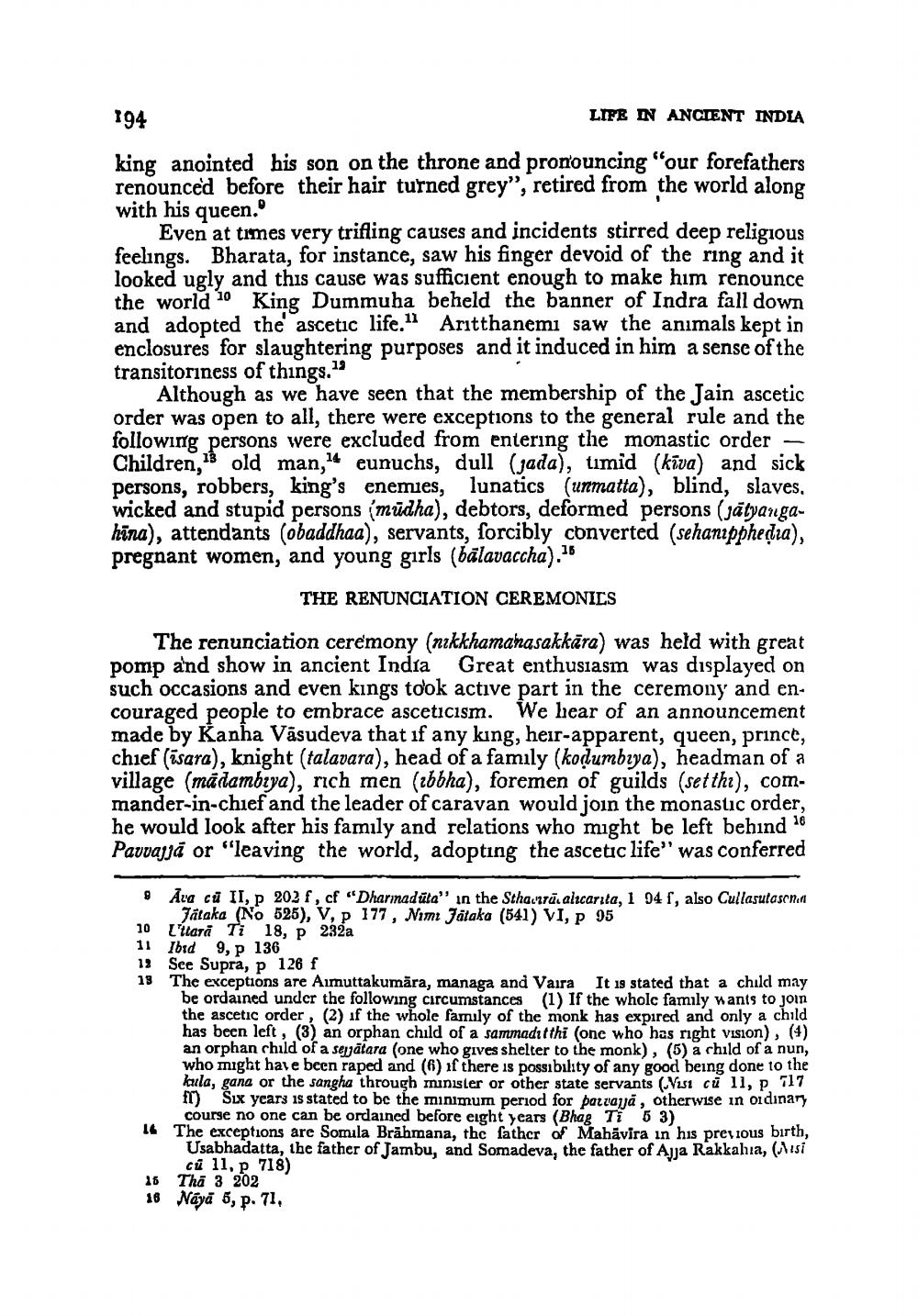________________
194
LIFE IN ANCIENT INDIA
king anointed his son on the throne and pronouncing "our forefathers renounced before their hair turned grey”, retired from the world along with his queen.
Even at times very trifling causes and incidents stirred deep religious feelings. Bharata, for instance, saw his finger devoid of the ring and it looked ugly and this cause was sufficient enough to make him renounce the world 10 King Dummuha beheld the banner of Indra fall down and adopted the ascetic life." Aritthanemı saw the animals kept in enclosures for slaughtering purposes and it induced in him a sense of the transitoriness of things."
Although as we have seen that the membership of the Jain ascetic order was open to all, there were exceptions to the general rule and the following persons were excluded from entering the monastic order – Children, old man,14 eunuchs, dull (jada), timid (kīva) and sick persons, robbers, king's enemies, lunatics (unmatta), blind, slaves. wicked and stupid persons (mūdha), debtors, deformed persons (jätyangahina), attendants (obaddhaa), servants, forcibly converted (sehanipphedra), pregnant women, and young girls (bālavaccha)."
THE RENUNCIATION CEREMONICS
The renunciation ceremony (nikkhamanasakkāra) was held with great pomp and show in ancient India Great enthusiasm was displayed on such occasions and even kings took active part in the ceremony and encouraged people to embrace asceticism. We hear of an announcement made by Kanha Väsudeva that if any king, heir-apparent, queen, princt, chief (isara), knight (talavara), head of a family (kodumbiya), headman of a village (mādambiya), rich men (zbbha), foremen of guilds (set thr), commander-in-chief and the leader of caravan would join the monastic order, he would look after his family and relations who might be left behind 16 Pavuajjā or "leaving the world, adopting the ascetic life" was conferred
0 Ava cū II, 202 f, cf "Dharmadüta" in the Sthadirāalicarita, 1 94 f, also Cullasulasemin
Jätaka (No 525), V, p 177, Nim Jataka (541) VI, P 95 10 Lítară Ti 18, P 232a
Ibid 9, p 136 12 See Supra, p 126 f
The exceptions are Aimuttakumāra, managa and Vaira It 19 stated that a child may be ordained under the following circumstances (1) If the whole family wants to join the ascetic order, (2) if the whole family of the monk has expired and only a child has been left, (3) an orphan child of a sammadıtthi (one who has right vision), (4) an orphan child of a sejātara (one who gives shelter to the monk), (5) a child of a nun, who might have been raped and (6) if there is possibility of any good being done to the kula, gana or the sangha through minister or other state servants (V251 cull, p. 117 fT) Six years is stated to be the minimum period for par vanja, otherwise in ordinary
course no one can be ordained before eight years (Bhag Ti 6 3) 14 The exceptions are Somila Brāhmana, the father of Mahāvira in his previous birth,
Usabhadatta, the father of Jambu, and Somadeva, the father of Ajja Rakkahia, (ilisi
cü 11, p 718) 16 Thā 3 202 16 Naya 6, p. 71,




